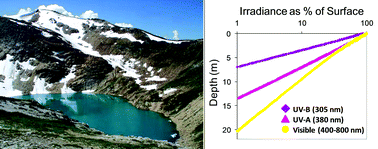Effects of UV radiation on aquatic ecosystems and interactions with climate change
Abstract
The health of freshwater and marine ecosystems is critical to life on Earth. The impact of solar UV-B radiation is one potential stress factor that can have a negative impact on the health of certain species within these ecosystems. Although there is a paucity of data and information regarding the effect of UV-B radiation on total ecosystem structure and function, several recent studies have addressed the effects on various species within each trophic level. Climate change, acid deposition, and changes in other anthropogenic stressors such as pollutants alter UV exposure levels in inland and coastal marine waters. These factors potentially have important consequences for a variety of aquatic organisms including waterborne human pathogens. Recent results have demonstrated the negative impacts of exposure to UV-B radiation on primary producers, including effects on cyanobacteria, phytoplankton, macroalgae and aquatic plants. UV-B radiation is an environmental stressor for many aquatic consumers, including zooplankton, crustaceans, amphibians, fish, and corals. Many aquatic producers and consumers rely on avoidance strategies, repair mechanisms and the synthesis of UV-absorbing substances for protection. However, there has been relatively little information generated regarding the impact of solar UV-B radiation on species composition within natural ecosystems or on the interaction of organisms between trophic levels within those ecosystems. There remains the question as to whether a decrease in population size of the more sensitive primary producers would be compensated for by an increase in the population size of more tolerant species, and therefore whether there would be a net negative impact on the absorption of atmospheric carbon dioxide by these ecosystems. Another question is whether there would be a significant impact on the quantity and quality of

- This article is part of the themed collection: Environmental effects of ozone depletion and its interactions with climate change

 Please wait while we load your content...
Please wait while we load your content...